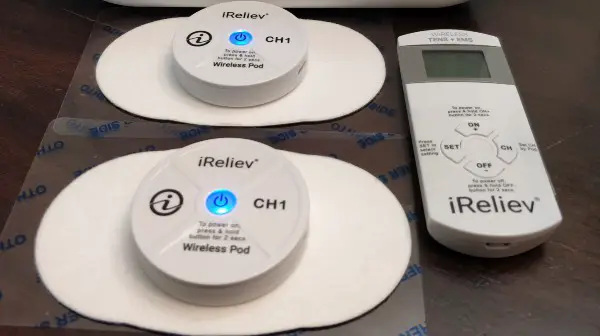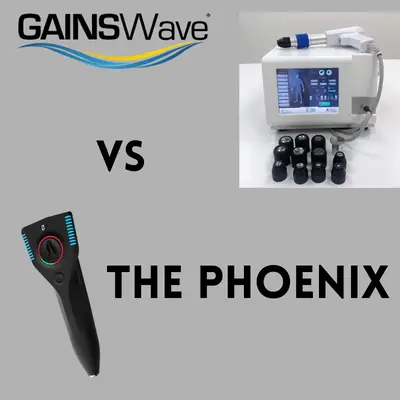TENS units are already quite famous for pain relief, but recently there have been more and more brands selling wireless units. Can those even provide pain relief?
Wireless TENS units work just as well as wired TENS units do. They are portable and discreet and just as powerful as wired TENS units. So, you could use one at any time, anywhere without anyone else noticing. Newer models even come with massage options, so you can get the best of both worlds.
Wireless TENS units may be new to the market, but they are fascinating and offer many benefits. If you want to learn more about how they work, what the benefits and downsides are, as well as how to find a model that will work for you, and how to use them safely, read on.
Looking for a Wireless TENS Unit?
Check out the Premium Wireless TENS Unit from iReliev.
quality TENS unit and iReliev gives you a ton of value for the price being paid. Best part is they are based in Dallas, Texas and have phenomenal customer service FREE shipping and delivery in less than 5 days.
How Does a Wireless TENS Unit Work?
Being in pain is certainly not comfortable. Your daily actions can be reduced, and you may even get stressed out and anxious more often. There’s also the fear of pain that so often happens if you’re suffering. However, a simple treatment like TENS can make you a lot happier and reduce your pain.
TENS units are simple devices in general, and you can use them for pain relief. The standard TENS units are bigger, and they come with cords, but the newer, wireless ones can help you reduce pain without any wires.
Wireless TENS units, just like standard ones, reduce pain by stimulating your nerves with electrical impulses and boosting the production of endorphins, the natural pain killers, in your body. It’s a simple, non-invasive, non-addictive process that you can do at home — or anywhere else you’d like.
The tiny shocks can reduce your pain and make your muscles more relaxed. The feeling you will get from TENS is generally going to be a tingling one, and if you feel pain, you should immediately reduce the intensity of the electrical impulses.
Aside from chronic pain patients, this machine is also often used by athletes or bodybuilders to reduce muscle soreness after exercise. The size of these units makes them even better than other forms of therapy because you can easily carry them around.
Most TENS units feature two to four electrodes, although you can get ones with more. The electrodes end in adhesive pads, which keep them attached to your skin. Each one should be at a different side of the pain, and they should be at least one inch apart.
The pain is reduced, especially while you use this device, but in some cases, even after the treatment ends. You can change the flow of the current, the frequency, and the strength in order to find a good one for you. Your doctor may recommend some settings, or you can use the preset modes.
Why Are Wireless TENS Better Than Regular TENS?
Wired TENS units may be a standard in the industry, but wireless units have been growing in popularity too. While wired TENS units are not much more expensive than wireless ones, you are probably aware of how quickly wires can wear out and need replacement.
This can mount up to a lot of money spent on something you end up throwing away. So, wireless units tend to be a more cost-effective option.
They are also more convenient, especially for some conditions. You can carry them everywhere and not have to deal with cables. This means that you can even exercise with them without the danger of pulling on one of the wires. At the same time, a wireless unit is discreet. It can look like you’re just scrolling on your phone while you’re actually using a TENS.
Want to know where a TENS unit can be placed? Check out my TENS placement guide here. Below are a few common TENS electrode pad placements:
Benefits of Using a Wireless TENS Unit
Here are some of the most notable benefits of using a wireless TENS unit:
- There are no cables. Wireless TENS units tend to be better for people who don’t want to be disturbed by the device in any way. For example, cables on your feet can get annoying if you want to run. Or, you can start pulling on them by accident and removing them before you want to. Plus, this makes it easier for an average user to carry. Cables can get tangled up easily, and this is frustrating.
- A wireless unit is discreet. This was already covered, but it’s important to note that a wireless TENS can be used beneath your clothes because the pads tend to be so small and thin that you’ll barely even notice them on the outside. Wires are hard to hide, but pads aren’t. You can keep them on, and you won’t feel the stares of other people wondering about what you are doing.
- They are easy to set up. With a small remote control or a phone app, you can decide which preset you want to use and then enjoy your massage or treatment. The devices that offer app control are even easier to work with.
- They are portable. TENS units are portable in general, but the wireless feature makes them even easy to carry.
- Replacement for medication. A wireless unit can always be on your side, so you can use it whenever you need pain relief. This is similar to how painkillers work, but you won’t have to take something that will enter your body and possibly cause addiction.
Of course, before using any type of TENS, consult your doctor and see what they think about using a TENS unit when taking your health condition into account.
Downsides of Using a Wireless TENS Unit
While wireless TENS units are amazing for many different things, and they do offer many advantages, they also have some negative sides. Here are some of them:
- Less presets. Regular TENS units have many different presets, but wireless units less so. If they do, they tend to be more expensive. But, it all depends on what you want from a TENS device.
- Lack of power. Some wireless TENS units have less power than standard ones because they are powered by batteries. This shouldn’t be a problem in general, but it might bother you.
- Not all of them will allow you to lie down. Certain units can allow you to lie down, but most of them will not have this option.
- You’ll have to use factory pads. With wireless units, one of the biggest problems is that they involve the usage of the factory pads, and you can’t replace them with any other ones.
- Wireless units have fewer electrodes. While standard units can have more electrodes, perhaps even eight, wireless ones don’t have the same option in most cases.
- You might get anxious. TENS units, in general, can create a feeling of anxiousness sometimes.
- You might get migraines. People who already suffer from migraines could get one from using a TENS device.
What to Know Before Purchasing a TENS Unit
Before buying a wireless TENS unit, you have to understand how to choose one. There are many different factors to consider, and you can learn more about that below.
- How many presets does it have? Presets are really important because they can help you ease into the usage of a TENS unit. You want to have as many options as possible, so it’s best to look for those units. Of course, you don’t want too many either, because you won’t know what to do with most of them, but a decent amount is necessary. You can then test them out and pick the one that works for you. Fortunately, most TENS units do have this option.
- How many electrodes does it have? Most wireless TENS units have only two electrodes, meaning that you can treat two spots at the same time with different intensities of different presets. You want a device that will enable you to do this, and optimally go for more than two channels. Naturally, you should understand your pain first and check if you truly need more than two.
- How many intensity levels are there? TENS units have different intensity levels, and you should be aware that you want to have more of these. Depending on your condition, you may need higher or lower intensity. The wider the range, the more likely you will be to find something that works for you.
- Is there a timer? Most people find timers annoying because they stop the treatment, but they are actually beneficial in most cases because they let you know when you need to stop. With most TENS units, you’ll have to stop after 20 minutes and move the pads, or you could get some side-effects.
- How long can the battery last? The battery is another important feature because you want your TENS unit to last as much as possible and be reliable. It’s also good to create a stock of batteries or recharge them often enough, so you’re never without your device.
- What is the size of the device? Since TENS devices are made to be portable, you need to find a device that won’t be too big. If you want to use it everywhere, you should find a small device that can fit into your pocket or under your clothes. Some wireless devices are small and very portable, but some are a bit bigger, and this might be inconvenient for you.
- Does it have an EMS? A TENS device doesn’t have to have an EMS, but it’s a beneficial addition. It’s especially good if you want to use it with exercise or simply for relaxation. EMS contracts the muscles, and this can be useful too. So, if you want this option, look for devices that also have an EMS option.
- Does it have accessories with it? It’s always a good thing when you can get accessories with your TENS unit. For example, things like extra pads or conductive gel. They should, ideally, come with the package. Some brands do this, and you should look for the ones that do. You might also want a bag where you could carry your TENS, so you don’t lose it.
When Should You Avoid Using TENS?
While TENS is generally safe to use, certain conditions don’t work well with this device. In these cases, you should avoid TENS and look for another solution. So, let’s learn which health issues may prevent you from using TENS.
- If you have sensitive skin. Some people have skin so sensitive that the pads create irritation or an allergic reaction for them. You should get hypoallergenic pads in this case or avoid TENS completely.
- Pregnant women. If you are pregnant, you shouldn’t use the device on your abdomen or your lower back. In general, it’s best to avoid it because science hasn’t yet determined what the effects on the baby will be.
- If you have heart issues. Heart disease patients shouldn’t use this device, or at the very least, they should contact their doctor before using it.
- If you have a pacemaker, a defibrillator, or any similar implant in your body, you should avoid using TENS.
- Don’t use TENS on the carotid artery, on your head, on your eyes, or even at the front part of your neck. This could cause spasms or adverse reactions that you don’t want. Search for other options if you have pain in those areas.
- If there’s a part of your skin that has gone numb, don’t use a TENS unit on it.
Before starting to use TENS, you should do your best to communicate with trusted medical staff and work with them to come up with a therapy that will suit you. You shouldn’t use this device without asking your doctor if you can use it. You may have a condition that you don’t know about, and a doctor could let you know if you need to avoid TENS.
How to Stay Safe While Using a Wireless TENS Unit
TENS units are generally safe, but there are some guidelines you need to follow in order to stay safe. Here are some tips:
- You should never use a TENS unit near water. It’s an electrical device, and water could mean danger.
- Don’t put a wireless TENS near heat. Don’t leave it in the sun, for example.
- Don’t use it while driving or (if your work involves it) while driving or operating machines.
- Don’t keep it near alarms or baby monitors.
- Don’t put electrodes on your eyes, head, the front part of the neck, any wounds, near tumors, or on the lower belly if you are pregnant.
- Don’t use this device on children under 12.
- Change the position of the pads every 20 minutes to avoid irritation.
- Don’t use wireless TENS for more than an hour.
- Always use TENS with a timer if napping or sleeping.
TENS devices are usually used based on the type of pain and area of pain. So, if you have chronic pain in multiple areas, for instance, you can choose the medium intensity and increase it slowly and purchase a TENS with more electrodes. If you have pain in smaller parts like fingers, get the one that has an electrode option for that.
You can also pick a TENS unit that has heat therapy involved. Pain responds well to heat, and you may enjoy it to combine TENS electrical stimulation with heat therapy or even massage. You should be able to find all of these wrapped up in one useful device — perhaps one additional device if you want more options.
If you get wireless TENS with more channels — at least two — you should be able to treat many points of pain at the same time. Without wires, you’ll easily reach certain areas that could be in pain but hard to reach.
You can use a wireless TENS unit while moving around, exercising, walking, or performing any similar type of light activity. But don; ’t do that while driving or performing some serious task that could result in injuries for you if you doze off or relax a bit too much.
But, if you need some pain relief in the office or while flying, you can use wireless TENS without issues. You should be able to use the same pads for up to 150 times before replacing them, and you will be able to wash them ten times. This is great if you don’t want to spend extra money on replacing the TENS pads.
Conclusion
As you can see, a wireless TENS unit can work just as well as any other TENS unit. The only difference is that a wireless one may be more convenient. Of course, make sure that you get a good quality device with plenty of options and that you are using it properly, according to guidelines that come with the product.
You can also get a TENS unit, which gives you access to an app that will, in turn, allow you to control a TENS from your phone. Any TENS unit of good quality will enable you pain relief, and some of the newer models may even give you a nice massage.
Sources
- Europe PMC: Effectiveness of transcutaneous electrical nerve stimulation (TENS) for analgesia during biliary lithotripsy.
- Europe PMC: [TENS in the treatment of muscle spasm]
- Europe PMC: Phantom limb pain: relief by application of TENS to contralateral extremity.
- The Clinical Journal Of Pain: High and Low-Frequency TENS Reduce Postoperative Pain Intensity After Laparoscopic Tubal Ligation: A Randomized Controlled Trial
- Archives of Physical Medicine and Rehabilitation: Effects of TENS and topical skin anesthesia on soleus H-reflex and the concomitant influence of skin/muscle temperature
- Cochrane Library: Transcutaneous electrical nerve stimulation (TENS) for pain management in labor
- Google Patents: Transcutaneous electrical nerve stimulation (TENS) device
- Google Patents: Wireless delivery of transcutaneous electrical nerve stimulation (tens) treatments
- Pain, Clinical Section: Efficacy of Electroacupuncture and TENS in the Rehabilitation of Chronic Low Back Pain Patients
- Science Direct: Effects of TENS frequency, intensity, and stimulation site parameter manipulation on pressure pain thresholds in healthy human subjects






3 responses to “Do Wireless TENS Units Really Work?”
[…] Wireless TENS units are incredibly rare, and this system features one of the most advanced and easy-to-use wireless networks available. To use, you only need to attach the adhesive electrode pads, connect the receiver pods, set your desired settings, and enjoy. The included electrodes have a sticky, adhesive side that can be reattached to skin multiple times. […]
[…] you’re working with a wireless unit, you won’t need to manually connect your pads to the control unit. Instead, you’ll most likely […]
[…] TENS unit is really easy to use and is pretty straightforward. Some TENS are battery powered while others are powered […]